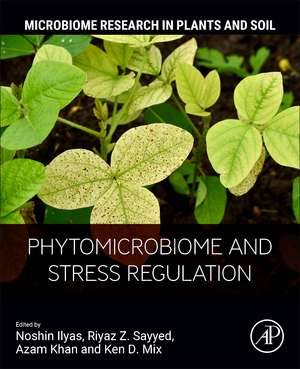Phytomicrobiome and Stress Regulation: Microbiome Research in Plants and Soil
Editat de Noshin Ilyas, Riyaz Sayyed, Azam Khan, Ken D. Mixen Limba Engleză Paperback – aug 2025
- Highlights current research into the resilience of phytomicrobiomes to biotic and abiotic stresses and the benefit to plants
- Explains benefit to agricultural productivity by improving soil structure, increasing ecosystem nutrient availability, and developing new intervention for insect pests
- Presents the dynamisms of below- and above- ground microbiome in stress mitigation
Preț: 1383.19 lei
Preț vechi: 1796.34 lei
-23% Nou
Puncte Express: 2075
Preț estimativ în valută:
264.76€ • 287.68$ • 222.54£
264.76€ • 287.68$ • 222.54£
Carte nepublicată încă
Doresc să fiu notificat când acest titlu va fi disponibil:
Se trimite...
Preluare comenzi: 021 569.72.76
Specificații
ISBN-13: 9780443335945
ISBN-10: 044333594X
Pagini: 525
Dimensiuni: 191 x 235 mm
Editura: ELSEVIER SCIENCE
Seria Microbiome Research in Plants and Soil
ISBN-10: 044333594X
Pagini: 525
Dimensiuni: 191 x 235 mm
Editura: ELSEVIER SCIENCE
Seria Microbiome Research in Plants and Soil
Cuprins
PART 1: MICROBIOME AND STRESS
1. Crop Microbiomes: Structure and function
2. Metabolites of Chemical Signaling Pathways from Crop–Microbe Interactions
3. Crop microbiome mediates stress tolerance through antioxidant mechanism
4. Soil Microbiome Diversity and stress regulation
5. Regulation of metabolites in plants by stress tolerant PGPR
6. Metabolomics as a Tool to Study Responses of Plant Growth Promoting Rhizobacteria to stress
7. Volatile compound of Microbiome induces stress tolerance
8. Recent advances in genetics of microbiomes
9. Functional genomics of phytomicrobiomes
PART 2: ABIOTIC STRESS
10. Role of crop microbiomes in crop production under changing climate – Past, present and future
11. Response of crop microbiomes to drought
12. Exploring relationship between crop microbiomes and plant nutrient stress
13. Response of phytomicrobiomes to nanopollution
14. Effect of cold stress on phytomicrobiomes
15. Impact of Heavy metals on crop microbiomes
16. Impact of waterlogging on phytomicrobiomes
17. Crop Microbiome in Salinity tolerance
18. EPS producing PGPR for stress tolerance
19. Agricultural pollution and phytomicrobiomes
PART 3: BIOTIC STRESS
20. Mediation of biotic stress in phytomicrobiomes
21. Crop microbiomes enhanced induced systemic resistance in plants
22. Phytobiome modulation to control the plant diseases
23. Pathogen Biocontrol through changes in phytomicrobiomes
24. Microbial biological control of pests by phytomicrobiomes
25. Phytomicrobiomes biocontrol agents against soil-borne plant diseases
26. Molecular and phenotypic responses of phytomicrobiomes against virus attack
27. Role of phytomicrobiomes in plant-parasitic nematodes control
1. Crop Microbiomes: Structure and function
2. Metabolites of Chemical Signaling Pathways from Crop–Microbe Interactions
3. Crop microbiome mediates stress tolerance through antioxidant mechanism
4. Soil Microbiome Diversity and stress regulation
5. Regulation of metabolites in plants by stress tolerant PGPR
6. Metabolomics as a Tool to Study Responses of Plant Growth Promoting Rhizobacteria to stress
7. Volatile compound of Microbiome induces stress tolerance
8. Recent advances in genetics of microbiomes
9. Functional genomics of phytomicrobiomes
PART 2: ABIOTIC STRESS
10. Role of crop microbiomes in crop production under changing climate – Past, present and future
11. Response of crop microbiomes to drought
12. Exploring relationship between crop microbiomes and plant nutrient stress
13. Response of phytomicrobiomes to nanopollution
14. Effect of cold stress on phytomicrobiomes
15. Impact of Heavy metals on crop microbiomes
16. Impact of waterlogging on phytomicrobiomes
17. Crop Microbiome in Salinity tolerance
18. EPS producing PGPR for stress tolerance
19. Agricultural pollution and phytomicrobiomes
PART 3: BIOTIC STRESS
20. Mediation of biotic stress in phytomicrobiomes
21. Crop microbiomes enhanced induced systemic resistance in plants
22. Phytobiome modulation to control the plant diseases
23. Pathogen Biocontrol through changes in phytomicrobiomes
24. Microbial biological control of pests by phytomicrobiomes
25. Phytomicrobiomes biocontrol agents against soil-borne plant diseases
26. Molecular and phenotypic responses of phytomicrobiomes against virus attack
27. Role of phytomicrobiomes in plant-parasitic nematodes control





